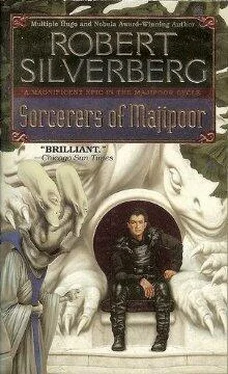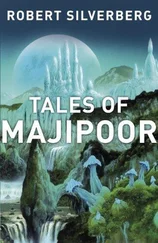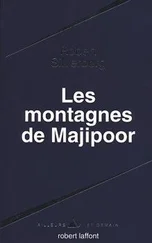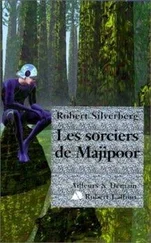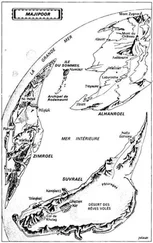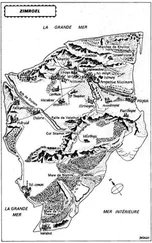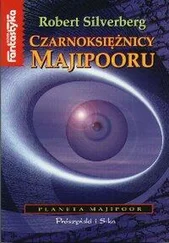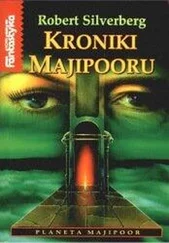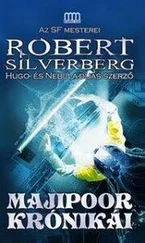And shapes were visible today, far out to sea, that might have been the shapes of dragons, unless they were something else. “I see them!” one pilgrim cried to the next in surprise and delight. “A miracle! The dragons are here!” And perhaps they were. Humped gray forms like bulky barrels floating in the sea? Dark wide-spreading wings? Yes, dragons. Maybe so. Or maybe just illusions, born of the glinting and flashing of sunlight against the churning tops of the waves.
“I see them, I see them!” the pilgrims continued to cry, shouting it until their voices grew hoarse and ragged, each one spurring his neighbor on toward desperate certainty.
And at the very summit of the rock known as Lord Zalimox’s Chair the mages in their saffron chasubles and surplices of bright silk lifted their staffs of smooth white bone one by one and held them toward the sea and in tones of the greatest solemnity called out words in a language that no one understood:
“Maazmoorn … Seizimoor … Sheitoon … Sepp!”
From the congregation at the water’s edge resounded the answering cry:
“Maazmoorn … Seizimoor … Sheitoon … Sepp!”
And from the sea came, as ever, the rhythmic murmuring boom of the surf, saying things that the assembled worshipers were free to interpret in whatever way they wished.
In wondrous Dulorn, the shining diamond-bright city of crystalline stone that the reptilian-looking Ghayrogs had built in western Zimroel, the amusements and entertainments of the Perpetual Circus had temporarily been put aside in this troubled hour, so that the huge circular building that housed the Circus could be employed for holier matters.
All the buildings of Dulorn were airy sparkling things of fantasy, but for this one. The white mineral out of which the Ghayrogs had constructed Dulorn was a dazzling light calcite of high refractiveness. They had employed it with surpassing ingenuity in fashioning slender lofty towers of fanciful form, richly ornamented with faceted sides and flying buttresses, with leaping minarets and dizzying diagonal embrasures, everything bright as if lit by sheets of lightning in the midday sun.
But the building of the Perpetual Circus, at the eastern edge of town, was a simple and unadorned circular drum, ninety feet high and in diameter of such an amplitude that it could easily contain an audience of hundreds of thousands. Here, because the snaky-haired forked-tongued Ghayrogs slept only a few months out of the year and were voraciously eager for diversion the rest of the time, theatrical performances of all sorts were held—jugglers, acrobats, teams of downs, trained-animal shows, prestidigitators, levitators, gobblers of live animals, anything at all that someone might deem amusing, a dozen or more acts at once on the huge stage—continuously, every hour of the day and every day of the year.
Now all that had, however, been put aside in favor of a circus of a different sort. In this city of unique and striking loveliness, deformity had lately come to be looked upon as sacred, and monsters of all sorts were brought forth into the arena from every part of Majipoor so that they could be worshiped and implored to intercede with the dark powers that threatened the world.
So here, strutting about like demigods, were pygmies and giants, pinheads and human skeletons, hunchbacks and gnomes, all manner of genetic detritus, the sad prodigies of a hundred kinds of miserable unfortunate births. Every nightmare distortion was on show here, monsters of unthinkable sorts, things so bizarre that no one would ever have dared to dream them: humans, Ghayrogs, Skandars, Hjorts, no species being spared, all packed one up against another. Here were two Ghayrogs whose bodies were joined at the back from shoulder to buttock, but one inverted in regard to the other, heads and feet in opposite ways; here was a woman whose boneless arms writhed like serpents, and a man whose fiery-hued head bore a ravenous orange bird bill that was curved like the beak of a milufta but even more savagely sharp. A man who was broader-bodied than he was tall, with arms like flimsy little flippers—a quartet of gaunt Liimen who were linked one to the next by a long ropy black umbilicus—a man with one giant eye in the center of his forehead; another with only a single leg, like a pedestal, proceeding from both his hips—another with feet at the ends of his arms, and hands sprouting from his ankles—
All this was displayed in turn to every sector of the immense auditorium, for the entire stage floated in a pool of quicksilver and turned slowly on hidden bearings, making a complete revolution in not much more than an hour. During regular performances of the Circus, those sitting in the circular tiers that rose in sloping circles to the roof of the building had only to sit where they were and it all would come to them.
But this was not a performance. It was a sacrament. Therefore the audience was allowed to come down out of the stands and mingle on the stage, as never was permitted ordinarily. A corps of Skandar wardens maintained order, keeping the swarming mass of worshipers filing from the seats in a single line with stinging blows of long batons, and prodding them swiftly onward from the stage once they had received the blessing for which they had come. Slowly, patiently, the members of the audience shuffled forward, knelt before this grotesque creature or that one, solemnly touched its knee or its toe or the hem of its robe, and then moved on.
In five locations only, equidistantly arranged around the great stage to form the points of a giant star, were there any open spaces in this multitude of monstrosities and their adorers. These five open places on the stage had been left clear for the holiest beings of all, the androgynes—those who combined in themselves the attributes both of male and female, and who thus represented the unity and harmony of the cosmos, which was the commodity that everyone on Majipoor most fervently wished to preserve.
No one knew the origin of the androgynes. Some said that they were from Triggoin, that half-mythical city in the northern reaches of Alhanroel where only wizards lived. Some had heard that they came from Til-omon or Narabal or Ni-moya or some other city of Zimroel, and some that they were from Natu Gorvinu in remotest Suvrael, while others claimed they were native to one of the grand cities of Castle Mount itself; but though there was no agreement over where it was they had come into the world, it was universally believed that they had been born at a single birthing to a witch-woman who had engendered them herself, entirely unaided, simply through the casting of powerful spells.
They were frail, pallid little creatures, these androgynes. But though they were no taller than children, their bodies were mature. Three had the gentle faces of women and distinct womanly bosoms, though small ones, but the well-developed genitalia of men below. The other two had the wiry, muscular upper bodies of men, with broad shoulders and flat, hard chests, but their hips were wide flaring female ones, their buttocks and thighs were full and plump, and at the joining of their legs they showed no trace of the male organs of generation.
Naked, impassive, they displayed themselves all day long and all night too at the five points of the imaginary star that linked them on the stage, protected from the eagerly reaching arms of the gaping multitudes by circular boundary lines of cool red sorcery-flame that no one dared to cross, and by platoons of dour-faced baton-wielding Skandars as well, just in case.
The androgynes stood staring at the crowds that passed before them in a distant, uncaring way, silent and aloof, like visitors from some other plane of existence. And throughout the long hours of the day and the night, the fearful people of Dulorn filed ceaselessly through the drum-shaped building of the Perpetual Circus, thousands and hundreds of thousands paying homage to the sacred monsters, reaching their hands out imploringly to the uncaring androgynes and crying out their prayer in staccato shrieks sharp enough to pierce the sky, and the message that they repeated was the same one going up to the heavens from the marchers in the streets of Sisivondal: “Spare us… Spare us…”
Читать дальше
